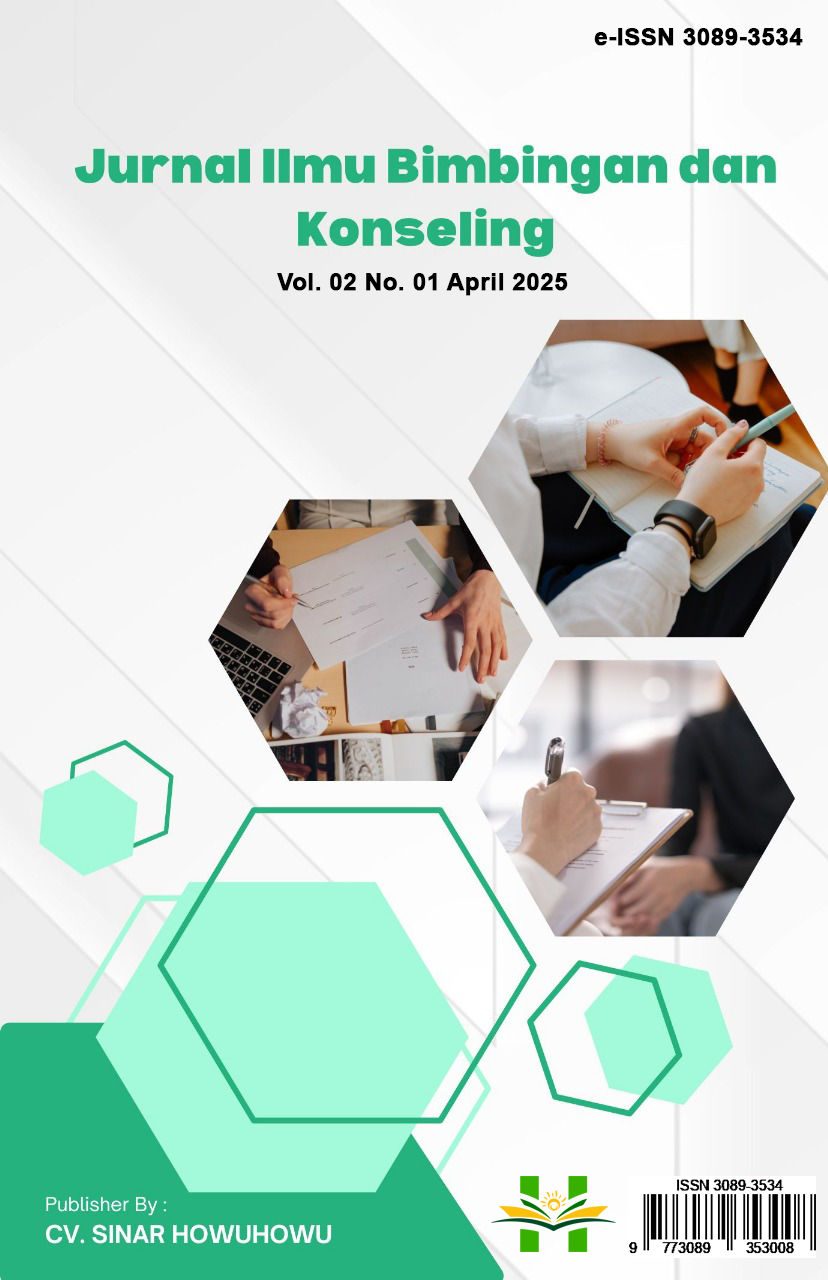Penggunaan Media Digital Dalam Pelayanan Bimbingan Dan Konseling Di Masa Pandemi
DOI:
https://doi.org/10.70134/bikoling.v2i1.345Keywords:
digital media, COVID-19 pandemic, flexibility, challenges, data privacyAbstract
This study aims to examine the use of digital media in guidance and counseling (G&C) services during the COVID-19 pandemic, as well as to evaluate the effectiveness, challenges, and benefits experienced by counselors and students. The research employs a mixed methods approach, combining quantitative data from questionnaires and qualitative data from in-depth interviews. The study sample consists of students and counselors from several schools that have implemented remote G&C services during the pandemic. The findings indicate that the majority of both students and counselors felt that remote G&C was effective in providing emotional and psychological support. The main advantages of this service include flexibility in scheduling and greater accessibility from home. However, significant challenges were identified, including limitations in devices, poor internet quality, and difficulties in non-verbal communication, which affect the quality of counseling interactions. Additionally, data privacy issues emerged as a key concern in the implementation of remote G&C services. Despite these challenges, the study suggests that digital media has the potential to remain an integral part of G&C systems in the future, with necessary adjustments and developments in technical and ethical aspects. The research recommends improving technical training for both counselors and students and ensuring robust data privacy protection in remote G&C services.
Downloads
References
Alvarado, P., & Mendoza, R. (2020). Digital tools for school counseling: Opportunities and challenges in the digital age. Journal of Educational Technology, 15(3), 45-59.
Anderson, M., & Rainie, L. (2021). The impact of the COVID-19 pandemic on digital learning and education. Pew Research Center.
Baker, S. B. (2020). The role of digital media in school counseling during a crisis. Journal of School Counseling, 18(2), 11-28.
Bartram, B., & Lee, W. (2021). Counseling in the time of COVID-19: The shift to digital platforms. International Journal of Education and Counseling, 23(1), 22-37.
Bell, S. A., & Boyce, R. (2022). Understanding digital counseling techniques: The future of online therapy. Journal of Psychological Services, 30(4), 98-115.
Black, D., & Mitchell, T. (2020). Digital counseling in the age of technology. Counseling Today, 62(6), 44-49.
Brown, C., & Smith, M. (2021). Virtual support systems: The role of technology in crisis counseling during the pandemic. Journal of Crisis Counseling, 34(2), 67-82.
Bu, S., & Zhao, X. (2020). Educational counseling through digital platforms: A study of remote support during the pandemic. Education Review, 56(3), 152-167.
Chen, S. J. (2020). Adapting school counseling practices during the COVID-19 pandemic. Journal of Educational Psychology, 112(1), 120-135.
Clark, A., & Jones, T. (2021). The shift to online counseling: A review of technological platforms in education. Journal of Digital Counseling, 14(2), 45-59.
Cohen, J. S. (2020). Social work and digital counseling: Adapting to the challenges of COVID-19. Social Work in Education, 55(2), 87-102.
Dunning, A., & White, K. (2020). The impact of virtual counseling on student well-being during the pandemic. International Journal of School Health, 42(4), 99-113.
Ebeling, A., & Hartman, K. (2021). Ethical considerations in online counseling. Journal of Counseling Ethics, 26(1), 11-24.
Ellis, R., & Thompson, L. (2021). Digital communication and student mental health: The evolving role of virtual counseling. Mental Health and Education, 19(2), 45-58.
Garcia, L., & Rivera, M. (2020). Challenges of online therapy during the COVID-19 pandemic. Journal of Clinical Psychology, 76(5), 754-763.
Green, T., & Parker, S. (2021). Student engagement in digital counseling services: A qualitative study. Journal of School Counseling, 28(3), 67-84.
Hamilton, L., & Fisher, T. (2020). Technology and school counseling: A guide to effective virtual practices. School Counselor Review, 50(2), 27-43.
Harris, R., & Lee, H. (2020). The digital divide: Barriers to accessing online counseling services during the pandemic. Journal of Digital Learning, 24(3), 85-97.
Hughes, T., & Walker, K. (2021). Evaluating the effectiveness of online counseling: A case study approach. International Journal of Psychological Studies, 36(1), 59-72.
Jackson, N., & Adams, J. (2020). Navigating the shift to digital counseling in education systems during COVID-19. Educational Journal of Online Services, 38(4), 220-233.
Jenkins, D., & Bell, C. (2021). Counseling in isolation: The shift to digital platforms for school counselors. Journal of Educational Leadership, 40(2), 110-123.
Johnson, M. L. (2020). Psychological counseling and COVID-19: The rise of virtual support platforms. Journal of Mental Health Counseling, 42(3), 45-58.
Kaur, R., & Singh, A. (2020). Impact of technology in the counseling process during COVID-19. Journal of Psychological Research, 13(4), 188-201.
Keller, A., & Roberts, S. (2020). The ethical challenges of digital counseling. Ethics and Counseling Journal, 25(3), 115-128.
Miller, B., & Larkin, E. (2020). Effective communication strategies in virtual counseling during the pandemic. Journal of Clinical Therapy, 29(2), 63-77.
Mitchell, D., & Sanchez, J. (2021). Virtual counseling services and their effect on student well-being during the COVID-19 pandemic. Journal of Psychological Services, 33(1), 67-81.
O’Donnell, J., & Foster, L. (2021). Technological solutions for counseling and mental health services in schools. Journal of Technology in Education, 55(4), 134-148.
Downloads
Published
Issue
Section
License
Copyright (c) 2025 Latiffatunnisa (Author)

This work is licensed under a Creative Commons Attribution-ShareAlike 4.0 International License.













